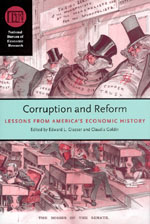Madoff an anomaly in an age of decency?
 This morning, Bernard Madoff, convicted master-mind of a giant Ponzi scheme that swindled investors out of $65 billion, was sentenced to 150 years in jail. Over the course of two decades, the financier perpetuated a fraud that has erupted into one of the largest scandals of modern Wall Street history. Madoff’s name has become synonymous with greed and corruption, but despite his high-profile crimes, he is not symbolic of the country as a whole. In fact, despite recent corporate scandals, the United States is among the world’s least corrupt nations.
This morning, Bernard Madoff, convicted master-mind of a giant Ponzi scheme that swindled investors out of $65 billion, was sentenced to 150 years in jail. Over the course of two decades, the financier perpetuated a fraud that has erupted into one of the largest scandals of modern Wall Street history. Madoff’s name has become synonymous with greed and corruption, but despite his high-profile crimes, he is not symbolic of the country as a whole. In fact, despite recent corporate scandals, the United States is among the world’s least corrupt nations.
This wasn’t the case, however, in the nineteenth century. Then, municipal governments and robber barons alike found new ways to steal from taxpayers and swindle investors. In fact, in those days, the degree of fraud and corruption in America approached that of today’s most unscrupulous developing nations. Exploring this shadowy period of United States history in search of better methods to fight corruption worldwide today, the contributors to Corruption and Reform: Lessons from America’s Economic History reveal the measurement and consequences of fraud and corruption and the forces that ultimately led to their decline within the United States. They show that various approaches to reducing corruption have met with success, such as deregulation, particularly “free banking,” in the 1830s. In the 1930s, corruption was kept in check when new federal bureaucracies replaced local administrations in doling out relief. Another deterrent to corruption was the independent press, which kept a watchful eye over government and business.
Though the Madoff scandal may seem to herald a new era of American financial malfeasance, it’s reassuring to know that corruption is less prevalent now than ever before in our nation’s history. And now that the monster behind the massive bamboozlement is behind bars, we can hope for a new age of honesty on Wall Street.